To implement the spirit of the university’s international high-quality development conference and advance the national key R&D program, Prof. Chen Xiaofang, Dean of the School of Management at Wuhan University of Technology (WUT), led a delegation to Sri Lanka from July 14 to 20, 2025. The visit focused on bilateral joint R&D and localized application demonstrations of smart logistics technologies, involving in-depth collaboration with local universities, research institutions, logistics enterprises, and port operators. The delegation also organized academic symposiums and met with relevant Sri Lankan government departments and Chinese diplomatic missions in the country.
Sri Lanka, located along the 21st Century Maritime Silk Road, serves as a critical node on the main Asia-Europe shipping route and plays a strategic role in ensuring the security of international logistics channels and the stability of supply chains for China. The delegation’s first stop was the Colombo International Container Terminal (CICT), a flagship project under the Belt and Road Initiative jointly built and operated by China Merchants Port Group and Sri Lankan partners. Recently ranked 22nd in global port connectivity, CICT has emerged as one of the most dynamic container ports in South Asia.
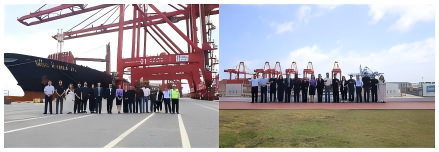
The delegation visited the terminal’s operational area and dispatch center, exchanging insights on the pilot implementation of collaborative projects. Both sides held detailed discussions on strategies for future demonstration and promotion, system optimization directions, and supporting mechanisms. The first batch of equipment has been deployed and performed reliably under high-intensity operational conditions, paving the way for expanded application. Nearly 100 frontline drivers have received centralized training in preparation for the system’s full launch.


During a symposium, Mr. Zhang Jianhui, CEO of CICT, extended a warm welcome to the delegation and provided an overview of the terminal’s current operations. He expressed strong appreciation for the phased achievements of the collaboration and looked forward to scaled deployment in the next phase, reaffirming his commitment to deepening practical cooperation with the School of Management in building smart ports.
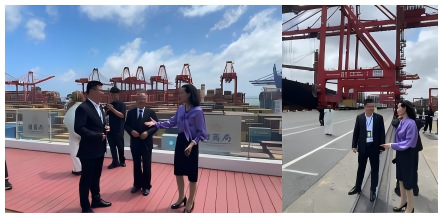
Dean Chen Xiaofang emphasized that the School of Management has long been dedicated to integrating technologies such as big data, artificial intelligence, and the Internet of Things into port dispatch and operational management. With a focus on intelligent decision-making, system optimization, and platform integration, the school actively contributes to the digital and intelligent transformation of ports, helping enhance operational efficiency and overall competitiveness while fostering a sustainable digital ecosystem for ports.
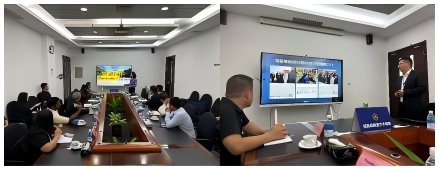
The delegation also attended the launch ceremony of the China Merchants “C-Blue Talent Program (Sri Lanka Class).” In her speech, Dean Chen encouraged Sri Lankan participants to engage in open and inclusive exchanges, serving as a bridge for Sino-Sri Lankan friendship. She also urged them to apply their learning toward hometown development and social services, growing into promising youth leaders capable of shouldering responsibilities in the new era.

The delegation visited Colombo Logistics, a leading integrated logistics service provider in Sri Lanka, introducing the school’s research strengths in logistics and supply chain management and demonstrating a smart logistics product independently developed by the project team. The product enables real-time tracking of transport vehicles and features intelligent driver behavior alerts, order management, and task scheduling. The company expressed strong interest in the system’s functional design and application potential, indicating a desire to explore collaboration models for implementing the technology in urban logistics scenarios.

During the visit, the delegation co-organized the first “China-Sri Lanka Smart Logistics R&D and Application Symposium” with multiple institutions from both countries. The event brought together experts from Wuhan University of Technology, Beihang University, the University of Colombo, the Colombo International Nautical and Engineering College (CINEC), the Sri Lanka Ports Authority, and relevant provincial departments. Dean Chen delivered an opening speech highlighting the school’s research foundation and practical experience in smart logistics, supply chain management, and digital ecosystem development. Prof. Zhang Hao, a member of the delegation, shared his latest research findings on unmanned port container truck fleet grouping, merging decision optimization, and trajectory planning.
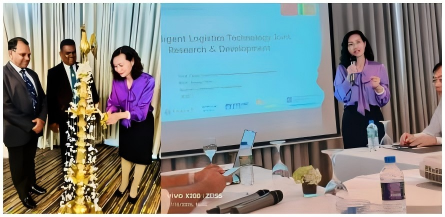
Prof. Karunaratne, a renowned Sri Lankan economist and former Vice-Chancellor of the University of Colombo, provided an in-depth analysis of the country’s current economic situation and future priorities. Prof. Lalith, a well-known logistics expert from CINEC, presented his recent research on improving transfer efficiency and system optimization at the Port of Colombo. Dr. Zhang Nianhua from Beihang University detailed his team’s progress in R&D and application exploration of autonomous driving and intelligent connected vehicle technologies. The symposium was well-received for its focused themes, substantial content, and lively interactions. Participants agreed to establish the symposium as a regular, institutionalized platform for smart logistics cooperation.
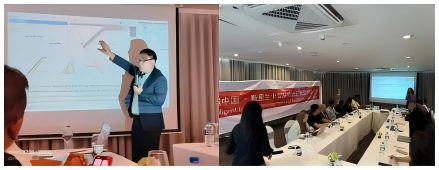
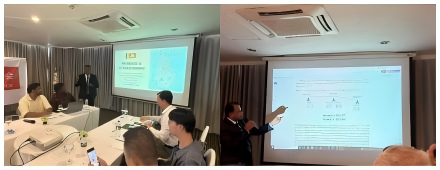
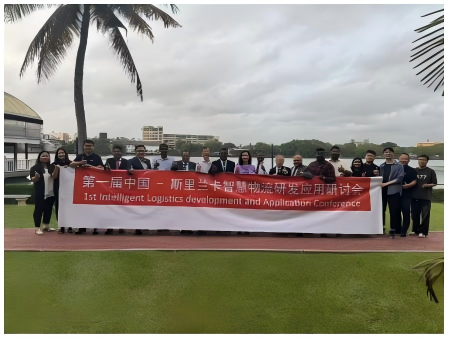
The delegation was warmly received on two occasions by Prof. Chrishantha Abeysena, Sri Lanka’s Minister of Technology. The minister was briefed on the phased outcomes and application progress of the joint R&D project. He spoke highly of the project’s practical results and recognized its potential to support Sri Lanka’s digital transformation and modernize its ports and logistics sector. Minister Abeysena emphasized Sri Lanka’s commitment to practical cooperation with China in science and technology, expressing hope for continued collaboration in artificial intelligence, digital infrastructure, and scientific and cultural exchanges. At his recommendation, the delegation also visited two key Sri Lankan research institutions—the Arthur C. Clarke Institute for Modern Technologies and the Industrial Technology Institute (ITI)—for in-depth discussions on research collaboration, technology transfer, and platform development.
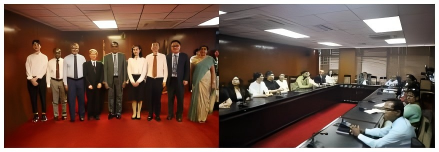
The delegation met with H.E. Qi Zhenhong, Chinese Ambassador to Sri Lanka, providing a detailed report on the latest progress of the national key R&D program and the key outcomes of the visit. Ambassador Qi praised the project’s achievements and affirmed the high-quality practical cooperation between China and Sri Lanka in smart logistics and other areas. He noted that Sino-Sri Lankan friendship dates back centuries, with historical figures such as the Tang Dynasty monk Amoghavajra visiting Sri Lanka (then known as Ceylon) for Buddhist missions, and Ming Dynasty explorer Zheng He making multiple stops in Sri Lanka during his voyages. Since establishing diplomatic ties in 1957, the two countries have continuously deepened cooperation in economy, trade, culture, and technology. Ambassador Qi encouraged the project team to leverage its expertise for long-term impact, promoting the application of Chinese technology, industry, standards, and rules in South Asia, and further strengthening Sino-Sri Lankan technological collaboration to inject vitality into high-quality development under the Belt and Road Initiative.
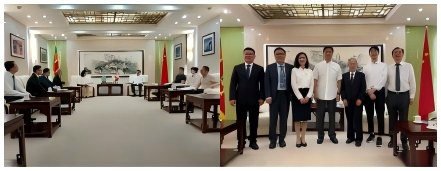
The gentle breeze of the Indian Ocean brushes over the island of Sri Lanka, also swaying the sails of Sino-Sri Lankan friendship. Against the backdrop of civilizational exchange and the expansion of the Maritime Silk Road, interactions between the two nations grow closer, and cooperation continues to deepen. May this azure sea witness more connections of minds, convergence of wisdom, and shared growth—and may China and Sri Lanka join hands to write a new chapter of mutual trust, mutual assistance, and shared prosperity.